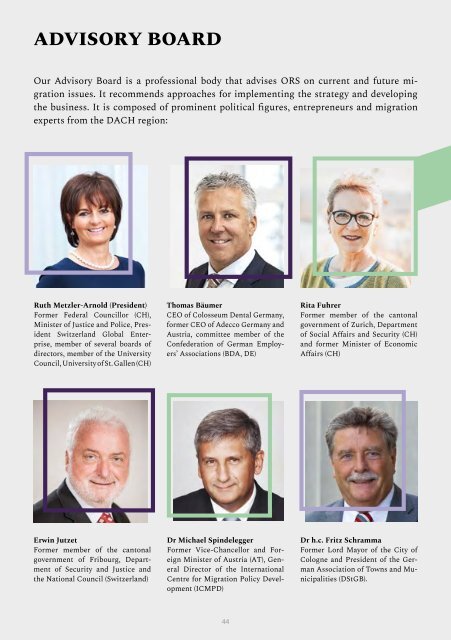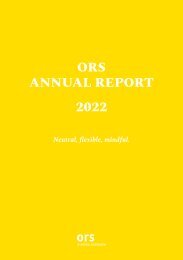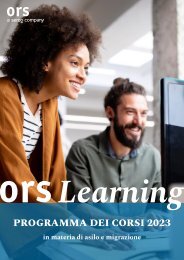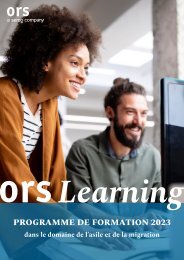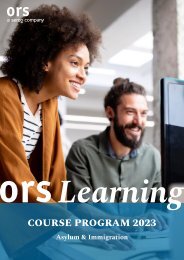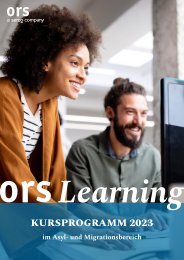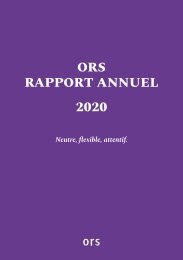ORS Annual Report 2020 English
ORS Annual Report 2020 in English
ORS Annual Report 2020 in English
You also want an ePaper? Increase the reach of your titles
YUMPU automatically turns print PDFs into web optimized ePapers that Google loves.
ADVISORY BOARD<br />
Our Advisory Board is a professional body that advises <strong>ORS</strong> on current and future migration<br />
issues. It recommends approaches for implementing the strategy and developing<br />
the business. It is composed of prominent political figures, entrepreneurs and migration<br />
experts from the DACH region:<br />
Rita Fuhrer: accompanying <strong>ORS</strong> on the<br />
Advisory Board<br />
As a teenager, Rita Fuhrer wanted to become a handicrafts teacher. Then a job at a<br />
health insurance organisation took her into politics and, from 1995 to 2010, she served<br />
as a parliamentarian for the canton of Zurich, where she was responsible for social and<br />
security policies. Political setbacks and health issues did not prevent her from campaigning<br />
for greater subsidiarity between the public and private sector. Since 2017, the<br />
ex-politician has served on the <strong>ORS</strong> Advisory Board, along with five other individuals<br />
from the worlds of politics and business.<br />
Ruth Metzler-Arnold (President)<br />
Former Federal Councillor (CH),<br />
Minister of Justice and Police, President<br />
Switzerland Global Enterprise,<br />
member of several boards of<br />
directors, member of the University<br />
Council, University of St. Gallen (CH)<br />
Erwin Jutzet<br />
Former member of the cantonal<br />
government of Fribourg, Department<br />
of Security and Justice and<br />
the National Council (Switzerland)<br />
Thomas Bäumer<br />
CEO of Colosseum Dental Germany,<br />
former CEO of Adecco Germany and<br />
Austria, committee member of the<br />
Confederation of German Employers’<br />
Associations (BDA, DE)<br />
Dr Michael Spindelegger<br />
Former Vice-Chancellor and Foreign<br />
Minister of Austria (AT), General<br />
Director of the International<br />
Centre for Migration Policy Development<br />
(ICMPD)<br />
Rita Fuhrer<br />
Former member of the cantonal<br />
government of Zurich, Department<br />
of Social Affairs and Security (CH)<br />
and former Minister of Economic<br />
Affairs (CH)<br />
Dr h.c. Fritz Schramma<br />
Former Lord Mayor of the City of<br />
Cologne and President of the German<br />
Association of Towns and Municipalities<br />
(DStGB).<br />
What motivated you to join the Advisory<br />
Board?<br />
I have been very familiar with the issues involved<br />
in supporting and accommodating<br />
asylum seekers ever since I began working<br />
as a parliamentarian back in 1995. Since<br />
then there have been huge developments<br />
– from a legislative point of view, from the<br />
point of view of the support organisations’<br />
human resource requirements, in the individual<br />
nature of the support and in the attitude<br />
of society. These developments are still<br />
ongoing. The challenges remain gargantuan.<br />
So I am happy to help wherever I can.<br />
Are there any areas of your work that you find<br />
particularly challenging as a woman?<br />
I have always had to prove that I am just<br />
as strong and experienced as a man. I have<br />
battled to try and ensure that a woman’s life<br />
experience and professional experience are<br />
respected as a matter of course. Why should<br />
having been in the military and led a platoon<br />
of recruits prove your management<br />
skills but having brought up three sons, as<br />
I have, apparently doesn’t?<br />
As a general rule: can women do more to influence<br />
decisions?<br />
A person’s perception has a lot to do with<br />
their own experience. That’s why women<br />
and men can listen to the same issues but<br />
hear different things, set different priorities<br />
as a result and often prefer different solutions.<br />
When you look at it like that, I can<br />
have a major influence on decisions if, as a<br />
woman, I view my own suggestions as just as<br />
valid and correct as those of a man and am<br />
prepared to back them up with conviction.<br />
If you could change anything in the course of<br />
gender history and equal rights, what would<br />
it be?<br />
Any change takes time. Despite the fact that<br />
equal rights have been enshrined in law for<br />
some time now, they’re not always reflected<br />
in everyday practice. The genders don’t<br />
have to be exactly the same, but it is important<br />
that they respect and value one another.<br />
When my daughter-in-law, who can<br />
manoeuvre any vehicle with a large trailer<br />
better than most men, takes her car to the<br />
garage because of a faulty turbo cable and<br />
the car mechanic explains to her that she’s<br />
probably just jammed the floor mat under<br />
the accelerator, that’s down to a lack of respect<br />
not a lack of equality.<br />
So if I could change anything, I’d demand<br />
honest acknowledgement of other people’s<br />
life experiences and unprejudiced respect.<br />
That would have made the journey towards<br />
the goal of equal rights simpler and shorter<br />
and, of course, it would have prevented a lot<br />
of distress.<br />
44<br />
45


